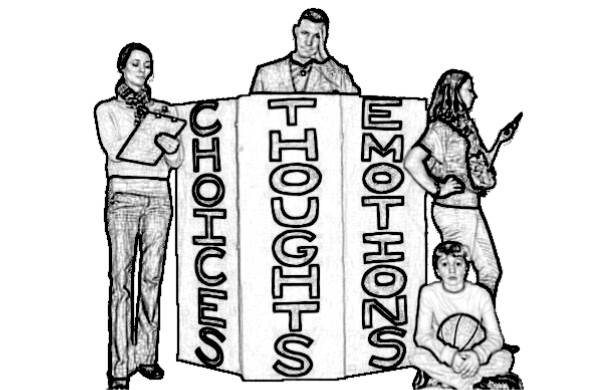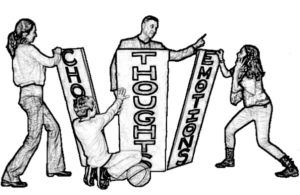What you Believe about Anger Enables Your Anger Problem

Because anger is a mixture of our emotions, thoughts and choices, it often feels like something that happens to us. Our prideful tendency is to shift the blame to others, causing us to feel justified in our victimhood. We express this position when we say things like, “You make me so mad,” or “I wouldn’t get angry if you didn’t treat me like that.” But are we willing to relinquish that level of control to another person? Is that what we really believe? In the moment it might feel that way, but is it an accurate expression of what is really happening? When we practice an unrestrained expression of our feelings, we become more confident that their motivations are truthful, and we quit trying to discern whether or not they actually are.
The Greek language is, among other things, very descriptive. Its verbs communicate meaning through mood, form, voice, and tense. The voice of the verb indicates the doer and/or receiver of the action. In the case of anger, the active voice would read, “I made you angry;” whereas, the passive voice would read “I was made angry by you.” In the first case, I was the doer of the action; in the second case, I was the receiver of the action. But the Greek language, unlike English, also has a middle voice where one can be both the doer and the receiver of an action. The Bible scholar W.E. Vine makes a significant point about the word “anger.” He notes that eight of the times it occurs in the Scripture, it is in the middle voice. In those instances, it literally means, “I made myself angry by what you did.”What makes this Biblical truth so challenging to grasp is that anger rarely feels that way. It genuinely feels like: I was made angry by you.
 Let me illustrate with an imaginary character by the name of Jack. Jack has anger problems. He knows it. His boss knows it, and most significantly, his family knows it. Like all of us, Jack’s inner life is comprised of his thoughts, emotions, and choices. But because of the deceptive nature of emotion, it always feels like circumstances are conspiring against him. And because he determines truth largely by how he feels, he believes other people are causing his anger. It’s almost as if he’s not an active participant. The reason Jack feels this way is that when he’s angry, his thoughts seem to run on their own; he doesn’t feel in control of his emotions. The only thing left of Jack’s inner identity is his choices. Yet, with his thoughts and emotions fueled by his anger, it feels as if his choices have been taken away as well. He’s even expressed it this way: I don’t have a choice but to get angry. Jack feels like he’s boxed in. We might even think of him as “Jack-in-the-box.”
Let me illustrate with an imaginary character by the name of Jack. Jack has anger problems. He knows it. His boss knows it, and most significantly, his family knows it. Like all of us, Jack’s inner life is comprised of his thoughts, emotions, and choices. But because of the deceptive nature of emotion, it always feels like circumstances are conspiring against him. And because he determines truth largely by how he feels, he believes other people are causing his anger. It’s almost as if he’s not an active participant. The reason Jack feels this way is that when he’s angry, his thoughts seem to run on their own; he doesn’t feel in control of his emotions. The only thing left of Jack’s inner identity is his choices. Yet, with his thoughts and emotions fueled by his anger, it feels as if his choices have been taken away as well. He’s even expressed it this way: I don’t have a choice but to get angry. Jack feels like he’s boxed in. We might even think of him as “Jack-in-the-box.”
 But the Bible teaches that Jack isn’t trapped in a box where his emotions, thoughts, and choices are decided for him. Notice the propositional statements of Scripture: It is for freedom that Christ has set us free (Gal. 5:1). I can do all things through Christ who strengthens me (Phil. 4:13). Or do you not know that you are the slave of whatever you choose to obey (Rom. 6:16). For you were called to freedom, brothers…through love serve one another (Gal. 5:13). As a believer, a better presentation of Jack would look like this image. Jack is set free to engage his emotions, thoughts and choices as he will. He received a new heart at the point of salvation. That new heart, filled with the Spirit of God, enables him to set his thoughts upon Christ, engage his emotions around the things of God, and make choices in light of the will of God. Certainly this is a process, and I would not want to infer that an emotional change takes place overnight. Still, our emotions usually follow what we have chosen to think about. With his new heart, Jack can now make choices and think differently than he did before. This is a theological reality that is incredibly freeing.
But the Bible teaches that Jack isn’t trapped in a box where his emotions, thoughts, and choices are decided for him. Notice the propositional statements of Scripture: It is for freedom that Christ has set us free (Gal. 5:1). I can do all things through Christ who strengthens me (Phil. 4:13). Or do you not know that you are the slave of whatever you choose to obey (Rom. 6:16). For you were called to freedom, brothers…through love serve one another (Gal. 5:13). As a believer, a better presentation of Jack would look like this image. Jack is set free to engage his emotions, thoughts and choices as he will. He received a new heart at the point of salvation. That new heart, filled with the Spirit of God, enables him to set his thoughts upon Christ, engage his emotions around the things of God, and make choices in light of the will of God. Certainly this is a process, and I would not want to infer that an emotional change takes place overnight. Still, our emotions usually follow what we have chosen to think about. With his new heart, Jack can now make choices and think differently than he did before. This is a theological reality that is incredibly freeing.
 But, when Jack is angry, it doesn’t feel that way. From his perspective in the box, it feels like anger is happening to him—like others are causing his anger. His son’s refusal to do his homework consumes his thoughts, his daughter’s belligerence fuels his emotions; and when his wife greets him at the door with a honey-do list, Jack feels like his choices for the weekend have already been made for him. As shown below, from where Jack stands in the box, it feels like his thoughts, emotions, and choices are out of his control. When anger is at work, he doesn’t feel free in Christ. He believes he has no other choice but to get angry. Because of our tendency to shift the blame for our wrongdoing to others, we are prone to interpret our anger in the passive voice. We are quick to say, “You make me so angry when you do that.” This is the angry man’s belief system: he believes that others are causing his anger.
But, when Jack is angry, it doesn’t feel that way. From his perspective in the box, it feels like anger is happening to him—like others are causing his anger. His son’s refusal to do his homework consumes his thoughts, his daughter’s belligerence fuels his emotions; and when his wife greets him at the door with a honey-do list, Jack feels like his choices for the weekend have already been made for him. As shown below, from where Jack stands in the box, it feels like his thoughts, emotions, and choices are out of his control. When anger is at work, he doesn’t feel free in Christ. He believes he has no other choice but to get angry. Because of our tendency to shift the blame for our wrongdoing to others, we are prone to interpret our anger in the passive voice. We are quick to say, “You make me so angry when you do that.” This is the angry man’s belief system: he believes that others are causing his anger.
 But remember that the Bible speaks of anger occurring in the middle voice. So, to bring what you believe in line with what the Bible is teaching, you need to say, “I make myself so angry when you do that.” Jack believes he is in a box because of what others are doing, but the truth is that he is the one controlling his thoughts, emotions, and choices. Biblically speaking, Jack’s anger occurs in the middle voice—he is the one causing it. This is why you will never overcome anger without first correcting your belief system. While anger feels like something that’s happening to you, it is actually something that you are doing to yourself. Your belief system matters. When you think about how you were wronged, you feel more justified in your belief system, and anger naturally follows. If you meditate on anything long enough, you will begin to believe it. The order matters: thinking leads to belief, belief fuels your emotions, and the emotions erupt in angry speech, actions, and attitude.
But remember that the Bible speaks of anger occurring in the middle voice. So, to bring what you believe in line with what the Bible is teaching, you need to say, “I make myself so angry when you do that.” Jack believes he is in a box because of what others are doing, but the truth is that he is the one controlling his thoughts, emotions, and choices. Biblically speaking, Jack’s anger occurs in the middle voice—he is the one causing it. This is why you will never overcome anger without first correcting your belief system. While anger feels like something that’s happening to you, it is actually something that you are doing to yourself. Your belief system matters. When you think about how you were wronged, you feel more justified in your belief system, and anger naturally follows. If you meditate on anything long enough, you will begin to believe it. The order matters: thinking leads to belief, belief fuels your emotions, and the emotions erupt in angry speech, actions, and attitude.
 Understanding anger in the middle voice actually brings great hope. You are free in Christ, even when it doesn’t feel that way. Work on bringing your belief system in line with the Scriptures; bring every thought captive, and you will discover that he who the Son sets free is free indeed.
Understanding anger in the middle voice actually brings great hope. You are free in Christ, even when it doesn’t feel that way. Work on bringing your belief system in line with the Scriptures; bring every thought captive, and you will discover that he who the Son sets free is free indeed.
Taken from Fighting the Fire: biblical strategies for overcoming anger

